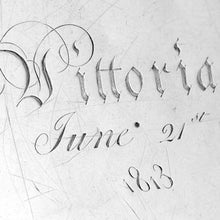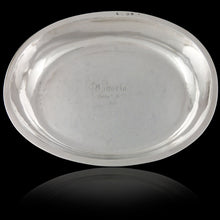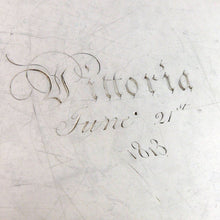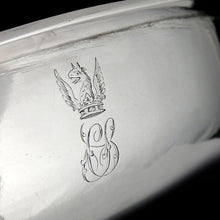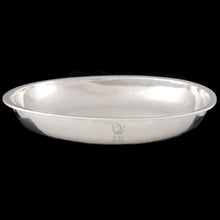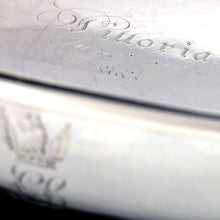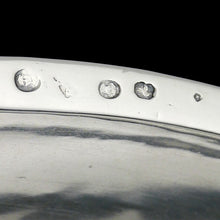95th Rifles - A Peninsula War Trophy, 1813
Adding product to your cart
28cm (11in) x 20cm (7.7in) x 4.5cm (1.7in)
Provenance: Lieutenant Lord Charles Spencer, 95th Rifles
Silver. Oval form entree dish, the base engraved in script ‘Vittoria / June 21st / 1813’ in commemoration of the rout of King Josef Bonaparte’s army. The front engraved with the ducal coronet and winged griffin’s head crest of the Spencer family over the initials CS for Lord Charles Spencer. Hallmarked Paris 1798-1809.
The present dish is a symbolic of a turning point in the fortunes of the Marquis of Wellington’s Army in the Peninsula War (1808-1814), being the beginning of the end for Napoleon. In May 1813, after a winter reorganizing and reinforcing his forces, Wellington marched once again from northern Portugal with 121,000 troops to attack King Joseph Bonaparte in Madrid. His brother, the Emperor had recalled to France drafts of experienced soldiers to reconstruct his main army after his disastrous invasion of Russia. Sensing an opportunity Wellington painstakingly positioned his forces to launch his attack with 57,000 British, 16,000 Portuguese and 8,000 Spanish at Vittoria on 21 June, from four directions.
Read more
Here the French under Joseph and his chief of staff Marshal Jourdan were soundly beaten and would have suffered further losses had they not abandoned ‘the loot of a kingdom’ as they withdrew. British troops turned from the pursuit to plunder some 3,000 abandoned French wagons containing treasure said to be worth £100 million in today’s terms, but the gross abandonment of discipline caused an enraged Wellington to write in a dispatch, "We have in the service the scum of the earth as common soldiers.” As is well known Wellington’s officers were no less keen on acquiring the spoils of war whether by fair means or foul.

Lord Charles Spencer (1794-1840) was the second son of the 5th Duke of Marlborough and Lady Susan Stewart, daughter of the 7th Earl of Galloway. He entered the Army as a Second Lieutenant in 1811, and transferred into the 95th Rifles from the 68th Foot, arriving in Spain in May 1812 in time to participate in the Battle of Salamanca where Wellington defeated the French under Marshal Marmot and entered Madrid. The 95th of course were Wellington’s famous green coated riflemen and were regarded as a corps d'elite during the Peninsula campaign.
In the autumn of 1812 however Wellington was forced to retreat before a concentration of superior strength. The retreat brought with it a break down in discipline, widespread drunkenness and fatigue that caused hundreds of Wellington’s men to be left in the mud to die or be taken prisoner by the French. Amidst all of this Sergeant Edward Costello, the author and Rifleman of the 95th, observed, ‘Lord Charles Spencer, then a youth about eighteen years of age, suffered dreadfully from the hunger and fatigue of this retreat; trembling with cold and weakness, he stood perched upon some branches, that had been cut down for fuel, the tears silently starting from his eyes through the pain he experienced, while thus sharing in the common lot, anxiously watching a few acorns, which to stay the pangs of hunger he had placed in the embers to roast. I dare say his Lordship had never known till then the joys of poverty - a good appetite! Nor will he, I expect, forget how willingly the rough soldiers flew to offer him biscuits, which their own sufferings could not withhold from one so tenderly and delicately reared …’
It is a testament to the men’s positive attitude to Spencer that they chose to share with him their meagre rations, in an age where the officers often ate well while the men starved. His popularity was further enhanced when the Rifles finally reached the sanctuary of the Light Division’s winter quarters at Alameda. Here Lord Charles demonstrated an aptitude for acting by dressing up in drag and taking one of the principal ladies’ parts in the Light Division’s production of Sheridan’s play ‘The Rivals’. One night in early February 1813 Wellington rode twelve miles from his headquarters to attend a performance. It was generally agreed that ‘Lieutenant Gore, 43rd, and Lord Charles Spencer, 95th' were ‘by no means badly dressed’ and as ‘passable for fine handsome women’, in fact, ‘regular guapas’. Harsher critics however objected to these ‘fair damsels’ drinking punch and smoking ‘segars’ between acts.

The Battle of Vittoria - Royal Collection
After Vittoria Lord Charles Spencer saw action at the battles of the Pyrenees (25 July 1813) and Nivelle (10 November), having become Lieutenant on 9 September 1813. Luck however deserted him at the Battle of the Nive, fought in south west France in early December, when he was severely wounded while serving as an Aide-de-Camp to the distinguished Rifles officer Lieutenant-General W. Stewart. From 1817 he became known Lord Charles Spencer-Churchill after his father changed the family name by royal licence. He later entered Parliament as member for the family borough of Woodstock.








